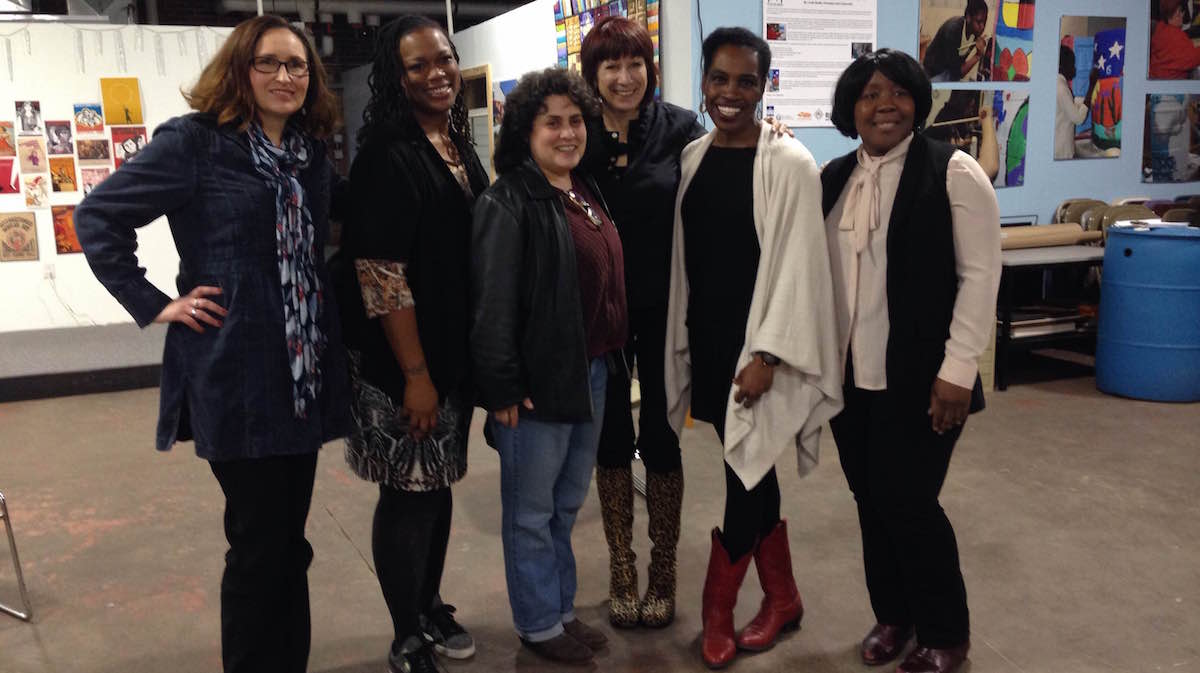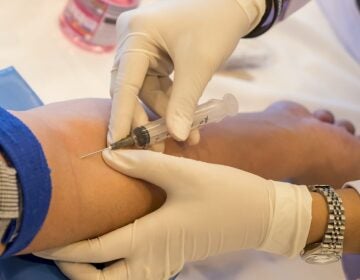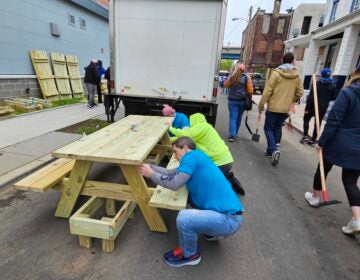Mt. Airy Art Garage honors International Women’s Day

From left: Mary Ann Domanska
At Sunday’s Mt. Airy Art Garage panel honoring International Women’s Day, a diverse group of leaders in the local arts and culture world found common ground as well as spirited differences in perspective.
The discussion, titled “It’s Not Over Yet! Women Artists Fighting For Our Rights,” was moderated by MAAG board member and Springside Chestnut Hill Academy teacher Mary Ann Domanska. Also an artist, poet, and actor, Domanska opened the floor by asking “What is it like when the art world tells you [that] you don’t belong?”
“It’s not that direct,” MAAG co-founder Arleen Olshan answered. Barriers for women artists aren’t always obvious, but they exist in many subtle yet pervasive ways, as participants explained.
In her student days at Pennsylvania Academy of Fine Arts, for example, Olshan (a painter and leatherworker) found that life was difficult for anyone who didn’t fit the institutional mold or anticipate its politics. Women students, for example, she said, might get fewer critique sessions. She also said that in U.S. fine arts programs today, a majority of students are women, but about 75 percent of faculty and administrators are men.
Panelist Miriam Davidson, the artistic director of Anna Crusis Women’ Choir and a Tyler alum, agreed that women faculty members were scarce in her own student days, but said they were highly influential.
Davidson spent 25 years touring as a folk singer/songwriter, and she said messages about not belonging to her field often came from male sound technicians who wouldn’t listen to her specifications, despite her extensive experience.
“It makes your back straighter and you stand up taller … makes you go after it harder,” she said.
Panelist Sally O’Driscoll, a writer and professor at Fairfield University, said that her graduate studies in the mid-1980s focusing on 18th-century women writers hit a major roadblock.
Despite the fact that 30 percent of novels written in the 1700s were penned by women, O’Driscoll said, there were no texts from women writers on her syllabi.
“They were no good,” she remembers her advisors saying. “Why would you want to work on second-rate writers?”
Fortunately, now, she said, this has changed: the study of women writers in this era has become a popular academic field.
Panelist Tieshka Smith, an activist, blogger and self-taught photographer formerly of Germantown and now living in West Philadelphia, challenged attendees to define the “art world” itself: is it artists? Galleries and museums? Collectors? When women or others find themselves on the margins, how do we define these institutions so that we can change them?
“Can we work with the establishment without becoming part of the establishment?” Smith wondered.
That question formed a major piece of the conversation as participants discussed their experiences and debated whether women are better off trying to work the system in their favor — even changing a professional name to a male moniker to gain traction with clients and tastemakers in the fashion world, for example – or if it’s necessary to disrupt the system as it exists.
“There is change, but it’s not systemic change,” said panelist Valerie V. Gay, a classically trained opera singer and certified financial planner who has also helmed the Art Sanctuary of Philadelphia since 2012. Gay said that especially when it comes to bringing new arts programming into educational settings, it can be better to stay “under the radar” and cultivate programs without asking permission from administrative leaders, who might otherwise deny arts access.
Gay also wondered if it’s necessary for women arts leaders to fit into the existing establishment for the sake of building space for others to come after them.
Trapeta B. Mayson, an artist, poet, and executive director of Historic Germantown, spoke about her experience with the three-fold challenge of being a woman, a person of color, and an immigrant (she was born in Liberia). She said “the need to create space, the need to create your own” is essential, and art-making “is as important to me as breathing.”
Smith, who spent many years working in grant-writing and grants administration, said she concluded that disruption, not bending within the system, is the key to her own practice, which combats racism through photography and multi-media participatory art forms.
“It may not be economically viable. It may mean people don’t want me in the room. But that’s OK.”
“I invite people into non-traditional spaces to help me co-create,” as in her current Racism Is a Sickness project, Smith explained. She wants participants to go back out into the world “questioning,” and when the number of people questioning the status quo hits a “critical mass,” that’s when an oppressive system begins to change.
Other discussion topics included the benefits and deficits of contemporary education, the question of whether social media polarizes us further or merely amplifies existing divides, women and mentorship, and a romanticizing of civil rights leaders that minimizes the real-life sacrifices and difficulties these activists lived and continue to live.
The panel also touched on the necessity of combining artistic aspirations with a businesslike sensibility, and the need for women to be confident of their work’s financial worth. Gay marveled that we idolize professional sports and make them an integral part of life, while marginalizing artists into categories of us and them.
“We have been force-fed and digested for ourselves this concept of the starving artist,” Gay said, when art in fact “is part of our entire being.” She pointed out that children aren’t discouraged from fantasizing about or pursuing careers in pro sports, when in reality, they’d have a much greater chance of sustaining themselves through arts-related services that communities always need.
Afterwards, MAAG co-founder and president Linda Slodki called the event “a welcoming of ideas.”
The fiber and textile art exhibition “No Longer Anonymous” will be up at MAAG through May 1. On Saturday, March 12 at 7 p.m., MAAG and hosting partner the Philadelphia Folksong Society will present the concert “Women Who Love Women Who Make Music,” featuring Anna Crusis, No Good Sister, Ashley Phillips and more.
WHYY is your source for fact-based, in-depth journalism and information. As a nonprofit organization, we rely on financial support from readers like you. Please give today.




